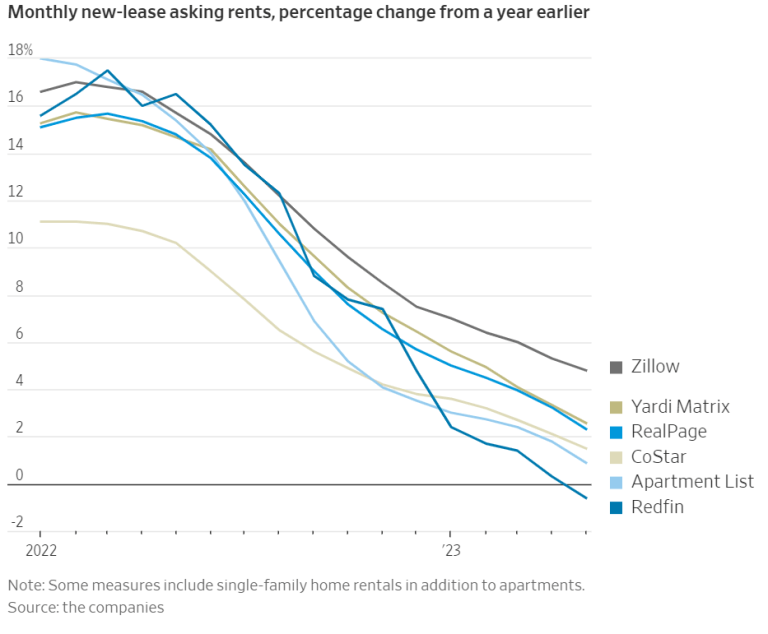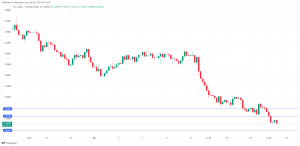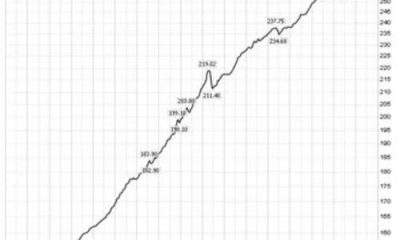Economics
Hutchins Roundup: Climate-induced losses, Russian oil price cap, and more
What’s the latest thinking in fiscal and monetary policy? The Hutchins Roundup keeps you informed of the latest research, charts, and speeches. Want…

By Elijah Asdourian, Moraa Ogendi, Lorae Stojanovic, David Wessel
What’s the latest thinking in fiscal and monetary policy? The Hutchins Roundup keeps you informed of the latest research, charts, and speeches. Want to receive the Hutchins Roundup as an email? Sign up here to get it in your inbox every Thursday.
Climate change will alter the geographic distribution of American workers and capital investment
Adrien Bilal of Harvard and Esteban Rossi-Hansberg of the University of Chicago project the effects of severe storms and heat waves on U.S. income, population, and investment over 80 years. Using weather records since 2000, they estimate localized productivity losses and capital depreciation from climate events. They then extrapolate these results into the future under the UN’s 4°C global temperature increase scenario. By 2100, workers in nearly every U.S. county will incur losses, with welfare reductions averaging 11.6% per year (equivalent to roughly $7,000 of reduced per-capita annual consumption today). This impact will be felt most acutely in the Southeast, prompting substantial migration. Florida could lose 46% of its residents, while some Northern cities may see populations double. Physical capital depreciation due to climate change is a large component of projected losses, with immovable assets like factories located in disaster-prone areas causing capital owners to incur welfare losses equivalent to 13.4% of annual consumption by 2100. These losses vary greatly with location, however, and some capital owners in cities with net inward migration and economic growth may enjoy welfare gains totaling over 50% of annual consumption.
Price cap on Russian oil could decrease global oil prices
Following Russia’s invasion of Ukraine, a $60 per barrel price cap was imposed on the sales of Russian oil that use western services like shipping, insurance, and trade finance. Simon Johnson of MIT, Lukasz Rachel of University College London, and Catherine Wolfram of the University of California, Berkeley, find that, if binding, such a cap can decrease global oil prices. The authors show that oil producers’ supply curve is inelastic and may even be downward sloping—that is, it may be optimal to increase production when faced with a lower price of oil. Rather than creating an oil supply shock, a price cap on oil sales reduces the incentive of producers to use market power, keeping global prices low and stable. However, should Russia find a way to sell oil outside of the restrictions, incentives to exercise market power will remain, making prices less stable.
Low-wealth households paid off debt with stimulus checks
Using data from a survey of U.S. households, Gizem Koşar of the New York Federal Reserve and co-authors find that households with low net wealth-to-income ratios were more likely than wealthier households to report using COVID-stimulus checks to pay down debt and less likely to use them to finance immediate consumption. This result is contrary to traditional models that predict higher marginal propensities to consume among lower-wealth households. The authors argue that, because the interest rates charged on household debt rise with household debt levels, low-wealth households benefited by paying off their expensive debt. The findings suggest that the households who use cash payments to stimulate the economy—higher-wealth households with higher marginal propensities to consume—are different than the households who received the highest welfare gains from stimulus checks—lower-wealth households who pay down debt.
Chart of the week: Rise in new-lease asking rents has slowed

Chart courtesy of The Wall Street Journal
Quote of the week:
“I certainly do not think it is in our interest to stifle the economic progress of the Chinese people. China succeeded in lifting hundreds of millions of people out of poverty. And I think that’s something that we should applaud. We certainly do have legitimate concerns regarding China, first and foremost national security where we absolutely have to protect our national security interests and not compromise on that… I think we gain and China gains from trade and investment that is as open as possible, and it would be disastrous for us to attempt to decouple from China. De-risk, yes, decouple absolutely not,” said Treasury Secretary Janet Yellen.
“…[W]e benefit greatly from access to cheaper products, a wide array of products and products in some cases where China has a technological lead. And in turn, China benefits from its purchases from us, and we benefit from our ability to export from China…. And so this is very valuable interaction and while we surely have concerns that need to be addressed, decoupling would be a big mistake.”
The Brookings Institution is financed through the support of a diverse array of foundations, corporations, governments, individuals, as well as an endowment. A list of donors can be found in our annual reports published online here. The findings, interpretations, and conclusions in this report are solely those of its author(s) and are not influenced by any donation.

Argentina Is One of the Most Regulated Countries in the World
In the coming days and weeks, we can expect further, far‐reaching reform proposals that will go through the Argentine congress.
Crypto, Crude, & Crap Stocks Rally As Yield Curve Steepens, Rate-Cut Hopes Soar
Crypto, Crude, & Crap Stocks Rally As Yield Curve Steepens, Rate-Cut Hopes Soar
A weird week of macro data – strong jobless claims but…
Fed Pivot: A Blend of Confidence and Folly
Fed Pivot: Charting a New Course in Economic Strategy Dec 22, 2023 Introduction In the dynamic world of economics, the Federal Reserve, the central bank…



















